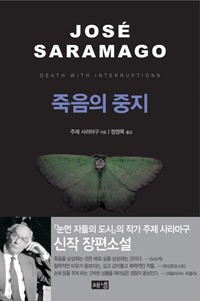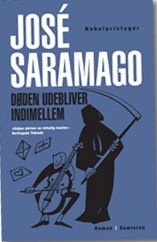The intermittences of death
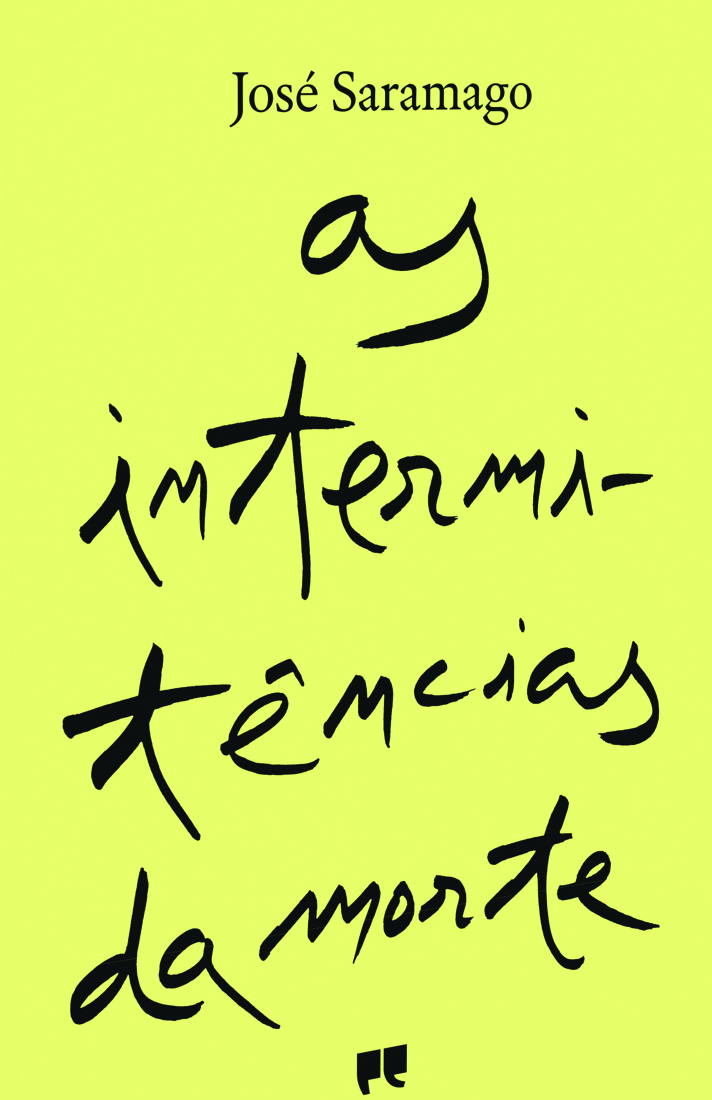
Ultimately, the book pushes open a door. It says what we all already know: that we have to die. But perhaps it shows, more clearly, that we have to die in order to live. Otherwise, life would be unbearable.
Foundation
Portugal
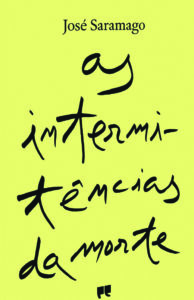
The calligraphy on the cover is by the writer Valter Hugo Mãe.
«"The next day, nobody died."»
This is how this novel by José Saramago begins.
Having posed the hypothesis, the author develops it in all its consequences, and the reader is masterfully guided through a broad digression on life, death, love, and the meaning, or lack thereof, of our existence.
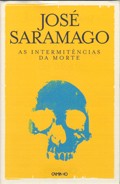
Leya
2006 – 2nd ed.
Language
Portuguese
«"The next day, nobody died.".
Thus begins this new novel by José Saramago. Having posed a hypothesis, the author develops it in all its consequences, and the reader is masterfully guided through a broad digression on life, death, love, and the meaning, or lack thereof, of our existence.
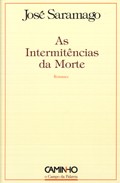
Editorial Path
2005
Language
Portuguese
«"The next day, nobody died.".
Thus begins this new novel by José Saramago. Having posed a hypothesis, the author develops it in all its consequences, and the reader is masterfully guided through a broad digression on life, death, love, and the meaning, or lack thereof, of our existence.
Circle of Readers
2006
Language
Portuguese
“"The next day, nobody died."”
Thus begins this novel by José Saramago. Having posed the hypothesis, the author develops it in all its consequences, and the reader is masterfully guided through a broad digression on life, death, love, and the meaning, or lack thereof, of our existence.

Leya
2010 (pocket edition)
Language
Portuguese
"The next day nobody died." Thus begins this novel by José Saramago. Having posed this hypothesis, the author develops it in all its consequences, and the reader is masterfully guided through a broad digression on life, death, love, and the meaning, or lack thereof, of our existence.
Germany

“Am darauffolgenden Tag starb niemand.” So beginnt der Roman, in dem das Unvorstellbare wahr wird, denn von diesem Moment an kommt kein einziger Mensch mehr zu Tode — weder gewaltsam noch friedlich. Die Bevölkerung ist verstört, die Politiker sind ratlos. Steuert das Land auf eine Katastrophe zu?
In seinem bizarre-philosophischen Roman stellt sich José Saramago den existenziellen Fragen unserer Zeit.
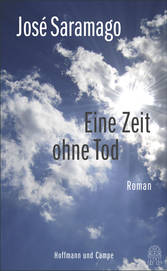
“Am darauffolgenden Tag starb niemand.” So beginnt der Roman, in dem das Unvorstellbare wahr wird, denn von diesem Moment an kommt kein einziger Mensch mehr zu Tode — weder gewaltsam noch friedlich. Die Bevölkerung ist verstört, die Politiker sind ratlos. Steuert das Land auf eine Katastrophe zu?
In seinem bizarre-philosophischen Roman stellt sich José Saramago den existenziellen Fragen unserer Zeit.

Und wenn einfach keiner mehr sterben würde?
Es ist der 1. Januar in einem nicht näher bezeichneten Land. Da geschieht, wofür es kein Beispiel in der Geschichte gibt: An diesem Tag stirbt niemand. Und auch am folgenden Tag nicht und am darauffolgenden. Selbst die Königinmutter, bei der es aussah, als würde sie den Jahreswechsel nicht mehr erleben, verharrt im Sterben. Eines Tages findet der Direktor des nationalen Fernsehens einen Brief auf dem Tisch, über dessen Erhalt er umgehend den Ministerpräsidenten in Kenntnis setzt. Der Brief stammt vom Tod…
«Bei allem Realismus, bei allem Engagement ist Saramagos Kosmos das Terrain der großen Geheimnisse, der wahren Mirakel, die resistent sind gegen Deutung, Aufschluss, Klärung.» Frankfurter Rundschau.
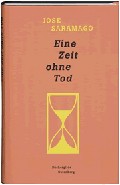
Büchergilde Gutenberg
2008 (Translated by Marianne Gareis)
Language
German
Was geschieht, wenn von einem auf den anderen Tag niemand mehr stirbt? Die Regierung ergreift sofort entsprechende Maßnahmen, und die katholische Kirche ist in ihren Grundfesten erschüttert… Es ist der 1. Januar in einem nicht näher bezeichneten Land. Etwas geschieht, wofür es kein Beispiel in der Geschichte gibt: An diesem Tag stirbt niemand. Und auch am folgenden Tag nicht. Der Tod streikt, so eine Reporterin. Die Regierung scheint entschlossen, den sich anbahnenden demographischen Problemen die Stirn zu bieten; die katholische Kirche ist in ihren Grundfesten erschüttert, denn ohne Tod keine Auferstehung. Die Gesellschaft spaltet sich: einerseits die Hoffnung, ewig zu leben, andererseits der Schrecken, nie zu sterben. Eines Tages findet der Direktor des nationalen Fernsehens einen Brief auf dem Tisch, von dessen Inhalt er umgehend den Ministerpräsidenten in Kenntnis setzt … Saramago führt seine in Die Stadt der Blinden begonnenen Experiment mit philosophisch-sozialen Fragen fort und erweist sich einmal mehr als großer literarischer Deuter der Welt. Seine Zeitzeugenschaft ist unerbittlich kritisch, künstlerisch gewagt und von einem skeptischen Humanismus geprägt.
Argentina
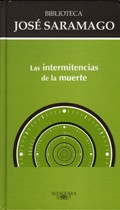
«We know less and less that you are a human being.» Book of predictionsIn a country whose name will not be mentioned, something never seen since the beginning of the world occurs: the dead decide to suspend their lethal work, the people stop dying. Collective euphoria is unleashed, but soon it will give way to despair and chaos. There are plenty of reasons. If it is clear that the people are not dead, that does not mean that time has stopped. The destiny of humans will be an eternal life. They will seek ways to force the dead to kill, even if it doesn't happen; Consciences will be corrupted in explicit or tacit “caballero agreements” between political power, mafias and families; The elderly will be detested for having become irremovable nuisances. Until the day when the dead decides to return…Starting once more from a proposition contrary to the evidence of current events, José Saramago develops a narrative of great literary, social and philosophical fecundity that places at the center the perplexity of men before the impossibly finite end of existence. Parable of the cut distance that separates the ephemeral and the eternal, The intermittences of death could end like emptiness: «The next day on the dead wall».
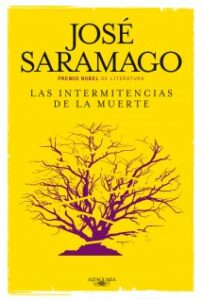
«We know less and less that you are a human being.» Book of predictions
In a country whose name will not be mentioned, something happens that has never been seen since the beginning of the world: the dead decide to suspend their lethal work, the people stop dying. Collective euphoria is unleashed, but soon it will give way to despair and chaos. There are plenty of reasons. If it is clear that the people are not dead, that does not mean that time has stopped. The destiny of humans will be an eternal life. They will seek ways to force the dead to kill, even if it doesn't happen; Consciences will be corrupted in explicit or tacit “caballero agreements” between political power, mafias and families; The elderly will be detested for having become irremovable nuisances. Until the day when the dead decides to return…Starting once more from a proposition contrary to the evidence of current events, José Saramago develops a narrative of great literary, social and philosophical fecundity that places at the center the perplexity of men before the impossibly finite end of existence. Parable of the cut distance that separates the ephemeral and the eternal, The intermittences of death could end like emptiness: «The next day on the dead wall».
Brazil
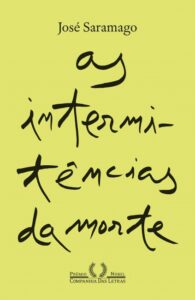
The calligraphy on the cover is by the writer Valter Hugo Mãe.
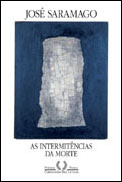
“There is nothing in the world more naked than a skeleton,” writes José Saramago, addressing the traditional representation of death. Only a great novelist could further strip bare this terrifying figure. Despite its inevitability, death also has its whims. And it was in death that the first Portuguese-language writer to receive the Nobel Prize in Literature found the material for his new novel, *Death with Interruptions*. Tired of being detested by humanity, the bony creature decides to suspend its activities. Suddenly, in a certain fabulous country, people simply stop dying. And what initially provokes a true patriotic outcry soon reveals itself to be a serious problem. The elderly and sick agonize in their beds, unable to “pass on to a better place.” Funeral service entrepreneurs find themselves “brutally deprived of their raw material.” Hospitals and nursing homes face chronic overcrowding, which continues to increase. The insurance companies' business enters a crisis. The prime minister doesn't know what to do, while the cardinal is inconsolable, because "without death there is no resurrection, and without resurrection there is no church." One by one, the links that connect the State, religions, and daily life to the common mortality of all citizens are exposed. But, in its intermittency, death can at any moment resume its usual affairs. So, what will become of the nation already accustomed to the chaos of eternal life? In the end, death itself is the main character in this "albeit true, untrue story about the intermittencies of death." This is enough for Saramago, mixing humor and bitterness, to address life and the human condition.
Bulgaria
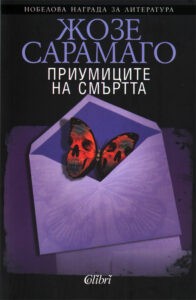
Какво би станало, ако смъртта реши да си почине и хората внезапно престанат да умират? What's wrong with your безнадеждно болните, с престарелите? Ще стигнат ли жилищата? Is it задъхат ли болниците? Is it просперират ли погребалните агенции? Read more прави придирчив analysis, без пропуска нито една подробност, описвайки настоящето и предвиждайки бъдещето.А какво би станало, ако на смъртта ѝ хрумне да се върне към обичайните си задължения, като изпраща What is the писмени известия? Нова, не по-малко сложна ситуация, развита от големия писател със същото въображение и същото внимание към детайла. Here's what logic means – известието за смъртта на един музикант непрекъснато се връща при подателката. Защо? What is the meaning of this? What is the meaning of „podade оставка“?
Colombia
Alfaguara
2005 (Translated by Pilar del Río)
Language
Spanish
«We know less and less that you are a human being.» Book of predictions
In a country whose name will not be mentioned, something happens that has never been seen since the beginning of the world: the dead decide to suspend their lethal work, the people stop dying. Collective euphoria is unleashed, but soon it will give way to despair and chaos. There are plenty of reasons. If it is clear that the people are not dead, that does not mean that time has stopped. The destiny of humans will be an eternal life. They will seek ways to force the dead to kill, even if it doesn't happen; Consciences will be corrupted in explicit or tacit “caballero agreements” between political power, mafias and families; The elderly will be detested for having become irremovable nuisances. Until the day when the dead decides to return…Starting once more from a proposition contrary to the evidence of current events, José Saramago develops a narrative of great literary, social and philosophical fecundity that places at the center the perplexity of men before the impossibly finite end of existence. Parable of the cut distance that separates the ephemeral and the eternal, The intermittences of death could end like emptiness: «The next day on the dead wall».
Korea
Croatia
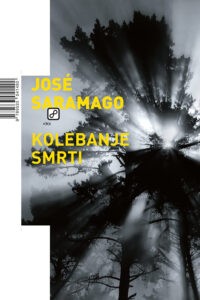
Točno u ponoć, jednog 31. prosinca, u nekoj neimenovanoj zemlji zavladala je vječnost, jer od tog trenutka više nitko neće umrijeti. Taj doga? u Katoličkoj Crkvi koja glasno prosvjeduje, jer bez smrti više nema uskrsnuća, a bez uskrsnuća nema Crkve…Nakon sedam mjeseci “jednostranog primirja“ smrt šalje ljubičastu omotnicu s pismom namijenjenom sredstvima javnog priopćavanja u kojem objavljuje prekid “štrajka“ i nastavak obaveze koju je preuzela prema ljudskom rodu. Iako su poduzete sve istražne mjere koje su vlastima bile na raspolaganju kako bi se identificirao njihov pošiljatelj (od analize rukopisa do rekonstrukcije lica), ljubičaste omotnice zlokobnog sadražaja i dalje stižu u domove ljudi kojima je preostalo tek tjedan dana života.Sve… osim jedne, koju smrt čak ni nakon tri pokušaja ne uspijeva poslati jednom violončelistu čiji portret, “kad bi uistinu postjao u glazbi, ne big ga pronašli ni u jednoj skladbi za violončelo, tek u jednoj kratkoj Chopinovoj etidi u ges duru“.Pretvorivši se u ženu, smrt odlučuje osobno uručiti pismo nesretnom primatelju. njegov dom i kriomica ga promatra dok spava…
Cuba
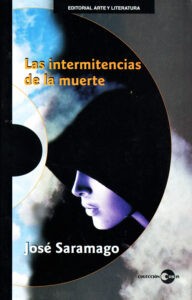
In a country without a name, something unexpected suddenly happens: the people want to die. Perhaps he represents one of the greatest deaths of the human being; but how many problems will this new reality bring? Promptly, strong confrontations and contradictions between the various government institutions and their struggle for power began to take place; Organizations arise with the aim of profiting, benefiting from the unexpected circumstances in which they live and among their own human beings, they bring out the most hidden feelings of anger and despair for not being able to free themselves from an eternal life. One day, the dead woman decides to return and begins another story…
Denmark
Spain
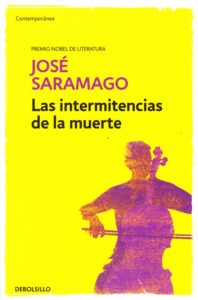
Alfaguara / Penguin Random House
2015 (DeBolsillo — Contemporánea) (Trans.: Pilar del Río)
Language
Spanish
If people want to die? A brilliant satire of the Nobel Prize winner for Literature that plays with the deepest fear of human beings.
«We know less and less that you are a human being.»
BOOK OF PREDICTIONS
In a country whose name will not be mentioned something happens that has never been seen since the beginning of the world: the dead decide to suspend their lethal work, the people stop dying. Collective euphoria is unleashed, but soon it will give way to despair and chaos. There are plenty of reasons. If it is clear that the people are not dead, that does not mean that time has stopped. The destiny of humans will be an eternal life.
They will look for ways to force death to kill someone who doesn't want to, if they corrupt their consciences in explicit or tacit «caballero agreements» between political power, mafias and families, the elderly will be detested because they have been converted into irremovable troubles. Until the day that the dead decides to return…
Starting once more from a proposition contrary to the evidence of current events, José Saramago develops a narrative of great literary, social and philosophical fecundity that places at the center the perplexity of men before the impossibly finite nature of existence. Parable of the cut distance that separates the ephemeral and the eternal, The intermittences of death could end just like emptiness: «The next day on the dying wall».
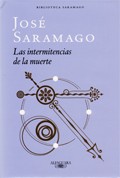
Alfaguara
2011 (Saramago Library Collection) (Trans.: Pilar del Río)
Language
Spanish
If people want to die? A brilliant satire of the Nobel Prize winner for Literature that plays with the deepest fear of human beings.
«We know less and less that you are a human being.»
BOOK OF PREDICTIONS
In a country whose name will not be mentioned something happens that has never been seen since the beginning of the world: the dead decide to suspend their lethal work, the people stop dying. Collective euphoria is unleashed, but soon it will give way to despair and chaos. There are plenty of reasons. If it is clear that the people are not dead, that does not mean that time has stopped. The destiny of humans will be an eternal life.
They will look for ways to force death to kill someone who doesn't want to, if they corrupt their consciences in explicit or tacit «caballero agreements» between political power, mafias and families, the elderly will be detested because they have been converted into irremovable troubles. Until the day that the dead decides to return…
Starting once more from a proposition contrary to the evidence of current events, José Saramago develops a narrative of great literary, social and philosophical fecundity that places at the center the perplexity of men before the impossibly finite nature of existence. Parable of the cut distance that separates the ephemeral and the eternal, The intermittences of death could end just like emptiness: «The next day on the dying wall».
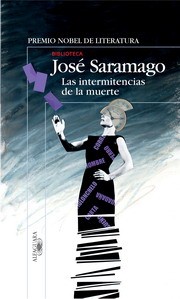
Alfaguara
2005; 2006 (Punto de Lectura - pocket edition) (Translated by Pilar del Río)
Language
Spanish
If people want to die? A brilliant satire of the Nobel Prize winner for Literature that plays with the deepest fear of human beings.
«We know less and less that you are a human being.»
BOOK OF PREDICTIONS
In a country whose name will not be mentioned something happens that has never been seen since the beginning of the world: the dead decide to suspend their lethal work, the people stop dying. Collective euphoria is unleashed, but soon it will give way to despair and chaos. There are plenty of reasons. If it is clear that the people are not dead, that does not mean that time has stopped. The destiny of humans will be an eternal life.
They will look for ways to force death to kill someone who doesn't want to, if they corrupt their consciences in explicit or tacit «caballero agreements» between political power, mafias and families, the elderly will be detested because they have been converted into irremovable troubles. Until the day that the dead decides to return…
Starting once more from a proposition contrary to the evidence of current events, José Saramago develops a narrative of great literary, social and philosophical fecundity that places at the center the perplexity of men before the impossibly finite nature of existence. Parable of the cut distance that separates the ephemeral and the eternal, The intermittences of death could end just like emptiness: «The next day on the dying wall».
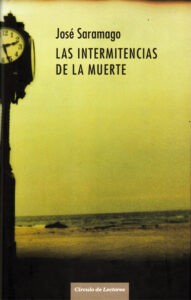
Readers' Circle
2006 (Translated by Pilar del Río)
Language
Spanish
Readers' Circle
2006 (Translated by Pilar del Río)
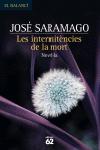
Editions 62
2005 (Catalan) (Trans.: Xavier Pàmies)
Language
Catalan
“L`endemà no one is going to die”. Here begins the new novel by José Saramago, a story about death ordained on a list of fantasy episodes, poetic images, philosophical reflections and social analysis, as well as humor and literary characteristics of the Portuguese Nobel Prize winner. traditional methods in an indeterminate country on the planet and across the entire social order. What would happen between insurance companies, funeral homes, església, hospitals and third-party residences if the death ceased to act? Would it be glory or chaos? Part of a fantasy of a general scope, Saramago descends to a particular level and speculates on the hypothesis of a life sense of death, on the possibility of a humanized death that is able to reach the apiadar of home, or even an ideal type of humanity.José Saramago (Azinhaga, Ribatejo, 1922), Nobel Prize winner Literature 1998, is one of the most important novels in contemporary literature. Editions 62 have been published Història del setge de Lisboa (1989), L'any de la mort de Ricardo Reis (1997), Tots els noms (1999), L'Evangeli segons Jesucrist (2000), La cave (2001), Quaderns de Lanzarote II (2001), Assaig sobre la ceguesa (2002) i L'home duplicat (2003). Other important titles by José Saramago: Manual of Painting and Calligraphy (1977), Object Almost (1978), Memorial do Convento (1982) and A Jangada de Pedra (1986).
USA
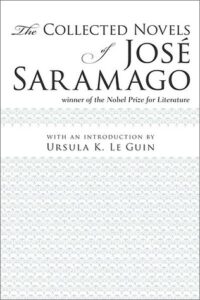
Houghton Mifflin Harcourt
2010 (Trans.: Giovanno Pontiero)
Language
English
This collection, available exclusively in e-book form, brings together the twelve novels (and one novella) of the great Portuguese writer José Saramago, with an introductory essay by Ursula Le Guin. From Saramago's early work, like the enchanting Baltasar & Blimunda and the controversial Gospel According to Jesus Christ, through his masterpiece Blindness and its sequel Seeing, to his later fables of politics, chance, history, and love, like All the Names and Death with Interruptions, this volume showcases the range and depth of Saramago's career, his inimitable narrative voice, and his vast reserves of invention, humor, and understanding.
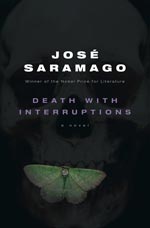
Harcourt
2008 (Trans.: Margaret Jull Costa)
Language
English
On the first day of the new year, no one dies. This of course causes consternation among politicians, religious leaders, morticians, and doctors. Among the general public, on the other hand, there is initially celebration—flags are hung out on balconies, people dance in the streets. They have achieved the great goal of humanity: eternal life. Then reality hits home—families are left to care for the permanently dying, life-insurance policies become meaningless, and funeral parlors are reduced to arranging burials for pet dogs, cats, hamsters, and parrots. Death sits in her chilly apartment, where she lives alone with scythe and filing cabinets, and contemplates her experiment: What if no one ever died again? What if she, death with a small d, became human and were to fall in love?
Finland
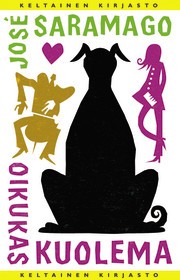
Nobelistin satiirinen ja kaunis tutkielma kuolemastaKertomus alkaa uudenvuodenpäivästä, josta lähtien eräässä kuningaskunnassa yksikään ihminen ei kuole. Ilmiö jatkuu viikosta ja kuukaudesta toiseen, ja saamme seurata miten tilanteeseen reagoidaan eri tahoilla. Kuolemaisillaan olevia ryhdytään salakuljettamaan rajan yli, jotta he pääsisivät rauhaan, kirkko hermostuu, kun sen koko rooli on uhattuna, hallinnon ja politiikan piirissä joudutaan paniikkiin, kruununperijän valtaa epätoivo… Sitten yhtäkkiä naishahmoinen kuolema lopettaa pitämänsä tauon ja omaksuu uudenlaisen menettelyn. Tästedes jokainen kuoleva saa viikkoa aikaisemmin kirjeitse tiedon tulevasta kuolemastaan, jotta osaa valmistautua lähtöönsä. Yksi kirje ei kuitenkaan tavoita määränpäätään. Kuoleman ei auta muu kuin lähteä ottamaan selvää, millainen ihminen on tämä hänen voimaansa vastustava olento. Kyseessä on orkesterissa soittava sellisti, joka asuu yksikseen koiransa kanssa ja harjoittelee omaksi ilokseen Bachin soolosellosarjoja.Saramago on itse luonnehtinut uusinta romaaniaan jatkoksi edelliselle (Kertomus näkevistä, suom. 2007) ja täsmentänyt, että lukijan on tarkoitus nauraa katketakseen. Teoksen alkuosa onkin hersyvää yhteiskunnallista satiiria tuttuun saramagolaiseen tapaan, mutta loppua kohti sävy muuttuu. Kertomuksesta kasvaa mielikuvituksellinen mutta aidontuntuinen rakkaustarina, jossa Johann Sebastian Bachin musiikilla on oma erityinen osansa. Eikä yksikään koiranomistaja voi heltymättä lukea, kuinka kauniisti Saramago kuvaa sellistimiehen ja hänen koiransa yhteiseloa. Vaikka Oikukas kuolema nimensä mukaisesti käsittelee kuolemaa, se on elämänmyönteisintä Saramagoa pitkään aikaan. « Palaa kirjan esittelyyn“Saramagolla on taito kuvata ihmiselämän mielivaltaisuutta ja hetkellisyyttä, ihmisten inhimillisiä heikkouksia, rakkauden parantavaa voimaa. Oikukas kuolema sisältää syvästi inhimillisen elämänkatsomuksen ja pitää hauskaa kielen ja ihmisluonnon epävakaisuuden kustannuksella.”
– Jouni Huhtanen, Lapin Kansa 23.1.2009
“"Saramago näyttää, että kirjoittaa voi mitä haluaa, ja omalla pistämättömällä tyylillä. Että leikistähän loppujen lopuksi on kyse. Ja että vakavuus on typerä kuningas."”
– Pirjo Suvilehto, Kaleva 31.12.2008
“Saramago onnistuu jollakin konstilla pelastaa hankkeensa, synnyttää uskottavuutta epätodennäköiseen, yhdistää viisaus ja mielikuvituksellinen leikki.
Olisiko se yksinkertaisesti vain kertomisen taitoa?
Jan Blomstedt
“Saramago saa lukijan kuitenkin hymyilemään ja välillä jopa remahtavaan nauruun, kun tuonen toimet paljastavat sen luonteen herkät piirteet.”
– Hanna-Riina Aho, Keskipohjanmaa 26.10.2008
France
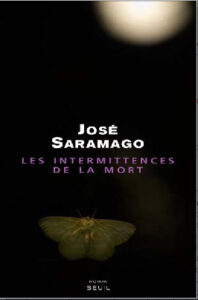
Dans un pays sans nom, un événement extraordinaire plonge la population dans l'euphorie : plus personne ne meurt. Mais le temps, lui, poursuit son œuvre, et l'immortalité, ce rêve de l'homme depuis que le monde est monde, se révèle n'être qu'une éternelle et douloureuse vieillesse. L'allégresse cède la place au désespoir et au chaos : les hôpitaux regorgent de malades en phase terminale, les families ne peuvent plus faire face à l'interminable agonie de leurs aînés, les entreprises de pompes funèbres ferment, les compagnies d'assurance sont ruinées, l'État est menacé de faillite et l'Église de disparition, car sans mort il n'y a pas de résurrection et sans résurrection il n'y a pas d'Église. Chacun cherche alors la meilleure fazn, ou la pire, de mettre fin au cauchemar de la vie éternelle, quitte à faire appel aux mafias, à passer des accords que la morale réprouve, ou à laisser la corruption gangréner la société.Jusqu'au jour où la mort décide de reprendre du service…
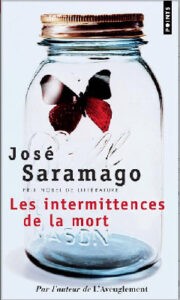
Dans un pays sans nom, un événement extraordinaire plonge la population dans l'euphorie : plus personne ne meurt. Mais le temps, lui, poursuit son œuvre, et l'immortalité, ce rêve de l'homme depuis que le monde est monde, se révèle n'être qu'une éternelle et douloureuse vieillesse. L'allégresse cède la place au désespoir et au chaos : les hôpitaux regorgent de malades en phase terminale, les families ne peuvent plus faire face à l'interminable agonie de leurs aînés, les entreprises de pompes funèbres ferment, les compagnies d'assurance sont ruinées, l'État est menacé de faillite et l'Église de disparition, car sans mort il n'y a pas de résurrection et sans résurrection il n'y a pas d'Église. Chacun cherche alors la meilleure fazn, ou la pire, de mettre fin au cauchemar de la vie éternelle, quitte à faire appel aux mafias, à passer des accords que la morale réprouve, ou à laisser la corruption gangréner la société.Jusqu'au jour où la mort décide de reprendre du service…
Greece
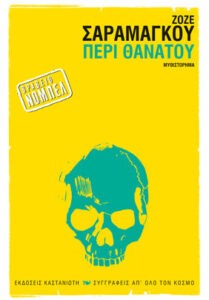
Αν στο Περί τυφλότητος, η τύφλωση ήταν καθολική, αν στο Περί φωτίσεως, η φώτιση ήταν γενικευμένη, στο Περί Θανάτου ο θάνατος λειτουργεί με διαλείψεις σε μια μικρή χώρα 10,000,000 κατοίκων, φέρνοντας σε απόγνωση, μετά την αρχική ευφορία, ασφαλιστικές εταιρείες, εργολάβους κηδειών, οίκους ευγηρίας, νοσοκομεία, εκκλησία, κυβέρνηση, οικογένειες. Η μαφφία (με 2 φ τη θέλει ο συγγραφέας) θα αναλάβει να δώσει λύσεις, αλλά ο θάνατος θα αντεπιτεθεί με τη μορφή μιας μυστηριώδους και γοητευτικής γυναίκας… Το πιο πρόσφατο και εξαιρετικά ανθρώπινο μυθιστόρημα του μεγάλου νομπελίστα συγγραφέα.

Αν στο Περί τυφλότητος, η τύφλωση ήταν καθολική, αν στο Περί φωτίσεως, η φώτιση ήταν γενικευμένη, στο Περί Θανάτου ο θάνατος λειτουργεί με διαλείψεις σε μια μικρή χώρα 10,000,000 κατοίκων, φέρνοντας σε απόγνωση, μετά την αρχική ευφορία, ασφαλιστικές εταιρείες, εργολάβους κηδειών, οίκους ευγηρίας, νοσοκομεία, εκκλησία, κυβέρνηση, οικογένειες. Η μαφφία (με 2 φ τη θέλει ο συγγραφέας) θα αναλάβει να δώσει λύσεις, αλλά ο θάνατος θα αντεπιτεθεί με τη μορφή μιας μυστηριώδους και γοητευτικής γυναίκας… Το πιο πρόσφατο και εξαιρετικά ανθρώπινο μυθιστόρημα του μεγάλου νομπελίστα συγγραφέα.
Netherlands
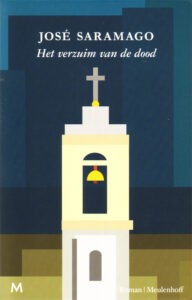
De volgende dag ging er niemand dood.' Zo luidt de openingszin van Het verzuim van de dood, de nieuwe, vertiende roman van José Saramago. In de nacht van 31 december op 1 januari van een niet nader bepaald jaar in een fictief land sterft er ineens niemand. Wanneer de dagen en weken erna blijkt dat het structureel is, leidt dat aanvankelijk tot grote vreugde. Maar die slaat allengs om in angst en bezorgdheid, omdat het einde van de dood verstrekkende gevolgen heeft: terminale patiënten blijven opgesloten in hun lijden, begrafenisondernemingen gaan failliet, verzekeringsbedrijven zien zich voor grote problemen gesteld, bejaarden- en verpleeghuizen kampen met schrijnend plaatsgebrek doordat de bedden en kamers tot in de eeuwigheid bezet dreigen te worden door dezelfde personen, enzovoort. Chaos ligt op de loer. Paniek ook, met name bij de regering en de kerkelijke overheid.
Het verzuim van de dood is een indrukwekkend en hilarisch boek; een nieuw hoogtepunt in het oeuvre van een van de grootse schrijvers van deze tijd.
Quotes
‘'Deze roman zal menige schaterlach aan de lezer ontlokken.'– José Saramago
‘'Saramago 's boeken roepen García Márquez in herrinnering vanwege epische pretenties, en met Primo Levi deelt hij het inzicht in de breekbaarheid van de door tegenspoed geplaagde mens.'– The Times
‘'Saramago dankt de Nobelprijs aan zijn verbeeldingskracht,de ironie die hij aan de dag legt en zijn grote vermogen met de mens mee te voelen.'– Academie voor de Nobelprijs
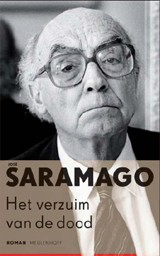
De volgende dag ging er niemand dood.' Zo luidt de openingszin van Het verzuim van de dood, de nieuwe, vertiende roman van José Saramago. In de nacht van 31 december op 1 januari van een niet nader bepaald jaar in een fictief land sterft er ineens niemand. Wanneer de dagen en weken erna blijkt dat het structureel is, leidt dat aanvankelijk tot grote vreugde. Maar die slaat allengs om in angst en bezorgdheid, omdat het einde van de dood verstrekkende gevolgen heeft: terminale patiënten blijven opgesloten in hun lijden, begrafenisondernemingen gaan failliet, verzekeringsbedrijven zien zich voor grote problemen gesteld, bejaarden- en verpleeghuizen kampen met schrijnend plaatsgebrek doordat de bedden en kamers tot in de eeuwigheid bezet dreigen te worden door dezelfde personen, enzovoort. Chaos ligt op de loer. Paniek ook, met name bij de regering en de kerkelijke overheid.
Het verzuim van de dood is een indrukwekkend en hilarisch boek; een nieuw hoogtepunt in het oeuvre van een van de grootse schrijvers van deze tijd.
Quotes
‘'Deze roman zal menige schaterlach aan de lezer ontlokken.'– José Saramago
‘'Saramago 's boeken roepen García Márquez in herrinnering vanwege epische pretenties, en met Primo Levi deelt hij het inzicht in de breekbaarheid van de door tegenspoed geplaagde mens.'– The Times
‘'Saramago dankt de Nobelprijs aan zijn verbeeldingskracht,de ironie die hij aan de dag legt en zijn grote vermogen met de mens mee te voelen.'– Academie voor de Nobelprijs
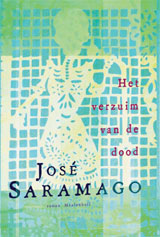
De volgende dag ging er niemand dood.' Zo luidt de openingszin van Het verzuim van de dood, de nieuwe, vertiende roman van José Saramago. In de nacht van 31 december op 1 januari van een niet nader bepaald jaar in een fictief land sterft er ineens niemand. Wanneer de dagen en weken erna blijkt dat het structureel is, leidt dat aanvankelijk tot grote vreugde. Maar die slaat allengs om in angst en bezorgdheid, omdat het einde van de dood verstrekkende gevolgen heeft: terminale patiënten blijven opgesloten in hun lijden, begrafenisondernemingen gaan failliet, verzekeringsbedrijven zien zich voor grote problemen gesteld, bejaarden- en verpleeghuizen kampen met schrijnend plaatsgebrek doordat de bedden en kamers tot in de eeuwigheid bezet dreigen te worden door dezelfde personen, enzovoort. Chaos ligt op de loer. Paniek ook, met name bij de regering en de kerkelijke overheid.
Het verzuim van de dood is een indrukwekkend en hilarisch boek; een nieuw hoogtepunt in het oeuvre van een van de grootse schrijvers van deze tijd.
Quotes
‘'Deze roman zal menige schaterlach aan de lezer ontlokken.'– José Saramago
‘'Saramago 's boeken roepen García Márquez in herrinnering vanwege epische pretenties, en met Primo Levi deelt hij het inzicht in de breekbaarheid van de door tegenspoed geplaagde mens.'– The Times
‘'Saramago dankt de Nobelprijs aan zijn verbeeldingskracht,de ironie die hij aan de dag legt en zijn grote vermogen met de mens mee te voelen.'– Academie voor de Nobelprijs
Hungary
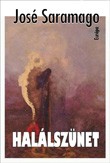
Egyre kevésbé tudhatjuk, mi is az emberi lény.A Jövõbelátás KönyveValahol valamikor egy tízmilliós országban egyik napról a másikra beszünteti tevékenységét a halál. Kaszáját a falnak támasztja, pihen, nem törõdik vele, hogy miatta elõbb-utóbb haldoklók százai fognak kilátástalan agóniában vegetálni. Az élõhalottak ellátása rengeteg idobe, pénzbe és türelembe kerül. Hozzátartozóik kétségbeesett cselekedetre szánják el magukat: külföldre viszik a szerencsétlen családtagot, mert az országhatáron kívül nincs halálszünet. Csakhogy a kegyeleti turizmus diplomatáciai bonyodalmakkal Jár, és etikai kérdéseket is fölvet. Különösen az után, hogy a „mapphia” is fantáziát lát az utaztatásban. halál, és nem is bejelentés nélkül ragadja el, akit kiszemelt magának, hanem levelet küld áldozatainak. Kékeslila – hullaszín – borítékban. Egy héttel a vég elõtt figyelmezteti õket, hogy itt az idõ, végrendelkezzenek, búcsúzkodjanak. Bocsássanak meg és kérjenek bocsánatot. Készüljenek fel a megváltoztathatatlanra. Mennyivel inkább illik ez a nõnemû halálhoz, mint a kasza! Mennyivel elegánsabb, tapintatosabb, nõiesebb!
A már-már idillien morbid ügymenet mégsem tökéletes, egy levél, egy ferfi áldozatnak küldött értesítõ ugyanis minduntalan visszamegy a feladónak…
Saramago legújabb regénye különös irodalmi csemege: irreálisba hajló mûvei közül az elsõ, amelyet teljes egészében átjár a légiesen erotikus köntösbe öltöztetett fantasztikum.
India
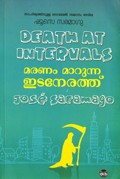
DC Books
2010 (Translated by Jolly Varghese)
Iran
Radmehr
2010 (Translated by Seyyed Habbib)
Language
Farsi
Radmehr
2010 (Translated by Seyyed Habbib)
Italy
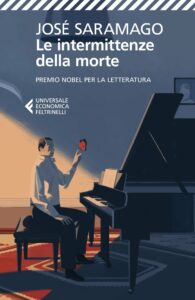
“"Il giorno sequente non morì nessuno. Il fatto, poiché absolutely contrario al le norme della vita, causò negli spiriti un enormous turbamento."”
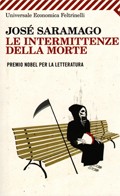
Un Paese senza nome, 31 dicembre, scocca la mezzanotte. E arriva l'eternità, nella forma più semplice e quindi più inaspettata: nessuno muore più. The gioia is great, the greatest angoscia dell'umanità will always remain sgominata. But this is not always the case: this death faced affari for some time and lost its reddit source. E cosa ne sarà della Chiesa, ora che non c'è più uno spauracchio e non serve più nessuna resurrezione? I problemi, come si vede, sleep molti and complessi. Regardless of death, with the fattezze of the lady, it follows its imprendibili ragionamenti: after seven months annuncia, with a letter written by hand, affidata a busta viola e directa ai media, which is per riprendere il suo usuale lavoro, fedele all'impegno di rinnovamento dell'umanità che la vede da semper protagonist. From there the lyrics viola parteno con cadenza regolare e raggiungono i loro sfortunati (or fortuneti?) intended, which returns to death as it suits. But a cellist, from the letter to a lui indirizzata, is a constant achievement for every three years, forcing death to search at his door to consecrate the person… A great fantastic creation, in which he won the great Nobel Prize in Portugal.
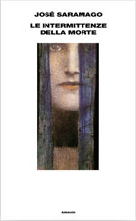
Einaudi
2005 (Translated by Rita Desti)
Language
Italian
«The next day I didn't die. Il fatto, poiché assolutamente contrario alle norme della vita, causò negli spirituali un enormous turbamento, cosa del tutto giustificata, ci basterà ricordare che non si riscontrava nei quaranta volumi della storia universale…»Il libro non è una riflessione philosofica o ontologica sulla morte. The tone is ironic, sarcastic. It's not even un'ipotesi, it's a surprising situation. Succede come negli altri romanzi: organizzo una situazione impossibile e ho bisogno che il tore accetti la mia proposa. If you do, I can see that everything is relentlessly logical.José SaramagoIn a non-meglio identified to Paese, allo scoccare della mezzanotte di un 31 dicembre, s'instaura l'eternità, perché nessuno muore più. The event raises a primal feeling of joy and felicity, but creates an anche scompiglio in the social stratum: from the government to the compagnie of assicurazione, from the agency of the pompe funebri alle case di riposo and, soprattutto, in the chiesa, the reason you protest if you take it high and strong: senza morte non c'è più resurrezione, e senza resurrezione non c'è più chiesa…
Dopo sette mesi di «unilateral truce», with a handwritten missive in a busta di colore violetto indirizzata ai mezzi di comunicazione, la morte dichiara di interrupte quel suo «sciopero» e di riprendere il proprio impegno con l'umanità. E nonostante vengano dispiegati tutti i mezzi investigativi (legali e non) a disposizione delle autrità (dall'esame grafologico all'identikit) per individuare il mitten – che viene poi identificato en una donna -, le buste di colore violetto continuano ad arrivare nalle case dei rispettivi destinedari con ilro nefarious content.
Tutte… tranne una, per ben tre volta rinviata al mittente e indirizzata a un violoncellista, il cui «ritratto, se davvero esistessero in musica, non lo si sarebbe ritrovato in nessuna composition per violoncello, ma en un brevissimo studio di Chopin, opera venticinque, numero nine, in G flat maggiore».
Therefore, assuming the fate of a donna, the death decides to personally consign the letter to the legitimate and blessed recipient. One comes back so much, and for that reason it is inspiegabile istinto, go to know your next victim and start spying on him, if you introduce, unseen, his house, and you will feel him dying...
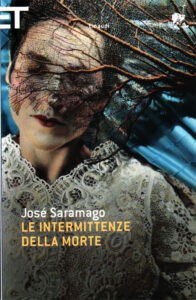
Einaudi
2006 (paperback edition) (Translated by Rita Desti)
Language
Italian
«The next day I didn't die. Il fatto, poiché assolutamente contrario alle norme della vita, causò negli spirituali un enormous turbamento, cosa del tutto giustificata, ci basterà ricordare che non si riscontrava nei quaranta volumi della storia universale…»Il libro non è una riflessione philosofica o ontologica sulla morte. The tone is ironic, sarcastic. It's not even un'ipotesi, it's a surprising situation. Succede come negli altri romanzi: organizzo una situazione impossibile e ho bisogno che il tore accetti la mia proposa. If you do, I can see that everything is relentlessly logical.José SaramagoIn a non-meglio identified to Paese, allo scoccare della mezzanotte di un 31 dicembre, s'instaura l'eternità, perché nessuno muore più. The event raises a primal feeling of joy and felicity, but creates an anche scompiglio in the social stratum: from the government to the compagnie of assicurazione, from the agency of the pompe funebri alle case di riposo and, soprattutto, in the chiesa, the reason you protest if you take it high and strong: senza morte non c'è più resurrezione, e senza resurrezione non c'è più chiesa…
Dopo sette mesi di «unilateral truce», with a handwritten missive in a busta di colore violetto indirizzata ai mezzi di comunicazione, la morte dichiara di interrupte quel suo «sciopero» e di riprendere il proprio impegno con l'umanità. E nonostante vengano dispiegati tutti i mezzi investigativi (legali e non) a disposizione delle autrità (dall'esame grafologico all'identikit) per individuare il mitten – che viene poi identificato en una donna -, le buste di colore violetto continuano ad arrivare nalle case dei rispettivi destinedari con ilro nefarious content.
Tutte… tranne una, per ben tre volta rinviata al mittente e indirizzata a un violoncellista, il cui «ritratto, se davvero esistessero in musica, non lo si sarebbe ritrovato in nessuna composition per violoncello, ma en un brevissimo studio di Chopin, opera venticinque, numero nine, in G flat maggiore».
Therefore, assuming the fate of a donna, the death decides to personally consign the letter to the legitimate and blessed recipient. One comes back so much, and for that reason it is inspiegabile istinto, go to know your next victim and start spying on him, if you introduce, unseen, his house, and you will feel him dying...
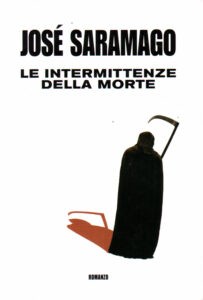
Mondolibri
2005 (Translated by Rita Desti)
Language
Italian
Mondolibri
2005 (Translated by Rita Desti)
Israel

(מרים טבעון)]נגן צ'לו רווק, כלב בעל מחשבות וחלומות, ואשה יפה כבת שלושים-ושש או שלושים-ושבע, הם גיבוריו של רומאן זה, שהוא עוד גילוי של כושר-ההמצאה הבלתי-נדלה של סאראמאגו. האשה חותמת על מכתביה “מוות”; ואכן בשפות רבות המוות הוא באופן מובהק אשה. באחד בינואר אף-אחד לא מת בכל רחבי המדינה הקטנה. לא ממחלה, לא מתאונה, לא מהתאבדות מוצלחת, ואף לא מסתם מוות פתאומי. ולא שאין פצועים, חולים, אנשים בתרדֶמֶת. אבל הם נשארים בְּחיים תלויים-ועומדים. הימים חולפים, והאנשים ממאנים למות, כאילו חריקת המספריים החותכים את פתיל החיים שבתה ממלאכתה. אושר חדש מציף את המדינה; האנושות זכתה בחופש לחיות. חלומה הגדול ביותר – להתגבר על העריצות הכי שרירותית בחיי אנוש, זו של קטיעת החיים, וליהנות מחיי נצח – התגשם והפך להיות נכס שווה לכל נפש. אך השמחה לא מאריכה ימים. בעצם, המדינה שקועה בצרות על צוואר. משבר המוות, היעדרו של החופש-למות, מתברר כעריצות גדולה פי כמה. די לחשוב על הצרות של הכנסייה, שבלי מוות ובלי תחייה אין משמעות לקיומה. ומה על כל עובדי ענף הקבורה, שחומר-הגלם שלהם נשלל מהם באכזריות, שלא לדבר על החברוֹת לביטוח-חיים הפושטות את הרגל; על בתי-החולים ההולכים ונסתמים בהיעדר תחלופה של גוססים; על בתי גיל הזהב המתמלאים יותר ויותר בזקנים-לנצח. עד שכעבור שבעה חודשים מגיעה הישועה: מוות חוזרת… וכאן יתחיל הסיפור הממשי. כל הרומאנים של סאראמאגו מציבים במרכזם איזו שרירות כובלת, מאובנת, עריצה – אשר מולה מפציעה חתרנות של רצון חופשי; ממריאה חירות אנושית המושגת באמצעות רגש והומניות. אבל ב'מוות לסירוגין' נטרפים הקלפים, הניגודים מחליפים צדדים ? ’מדובר באחד הספרים המהנים והנבונים של השנה… סאראמאגו יורה בכל הכוח בתותחי הריאליזם המאגי, ופוגע היטב“. (פאר פרידמן, 'מעריב')
Lithuania
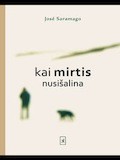
Literatūrinės Nobelio premijos laureato José Saramago Romanas kelia klausimą – kas atsitiks, jei vieną dieną nebebus mirties? Knyga prasideda sakiniu: „Sekančią dieną niekas nenumirė“.Nuo naujųjų metų pirmosios dienos neįvardytoje šalyje – niekas nebemiršta. Tai be abejonės pasėja siaubą ir sumaištį politikų, religinių lyderių, laidotuvių biurų savininkų ir gydytojų tarpe. Bet didžioji dalis visuomenės švenčia – pakeltos vėliavos, žmonės šoka gatvėse. Jie pasiekė did? laidotuvių namai priversti laidoti naminius gyvūnėlius: šunis, kates, žiurkėnus bei papūgas. Atsiranda nauja grupuotė, kuri siūlosi palengvinti ligonių šeimų naštą. Ši grupuotė, vadinama Maphia, organizuoja sunkių ligonių vežimą į kaimynines šalis, kuriose žmonės iškart miršta, nes mirtis ten nenustojo eiti į darbą.Mirtis sėdi savo vėsiame bute, kuriame gyvena viena su dalgiu, ir apmąsto savo eksperimentą – kas bus jeigu niekas niekados nemirs? Kas, jei ji, mirtis iš mažosios „m“, taptų žmogumi ir įsimylėtų?
Mexico
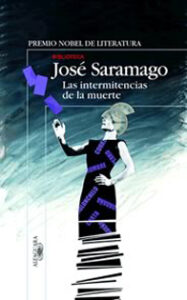
If one of these days it happens that no one in the world dies? If this situation continues and doesn't seem to last until when it ends?
Norway

”Dagen etter døde ingen. førtibinds verdenshistorien, ikke ett eneste tilfelle man kunne vise til, da det skulle ha gått en hel dag, med alle dens storslagne fireogtyve timer, dagtid så vel som nattetid, morgentid så vel som kveldstid, uten at det forekom et dødsfall grunnet sykdom, en dødsulykke, et fullført selvmord, absolute ingenting, kort sagt intet.”REVIEWS:”Fra en forfatter som er midt i 80-årene er dette et imponerende lekent verk.”Anne Cathrine Straume, NRK
Les hele anmeldelsen
“Døden som du aldri møtte den.”
Liv Riiser, Vårt land
“Det er ikke lett å vite hva som foregår i hodet til den portugisiske forfatteren José Saramago, men ut gjennom fingrene hans kommer det roman etter roman med de mest fantastiske historier”.
Einar O. Risa, Stavanger Aftenblad
Les hele anmeldelsen
“En bok som alle elskere av stor litteratur ikke kommer utenom..”
Torbjørn Trysnes, Fædrelandsvennen
Terningkast 5
“…ligger høyt over mye annet som gis ut.”
Anne-Lise Johnsen, Fredriksstad Blad
Les hele anmeldelsen
UK
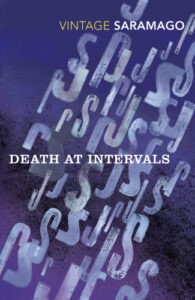
In an unnamed country, on the first day of the New Year, people stop dying. There is great celebration and people dance in the streets. They have achieved the great goal of humanity: eternal life. Soon, however, the residents begin to suffer. Undertakers face bankruptcy, the church is forced to reinvent its doctrine, and local 'maphia' smuggle those on the brink of death over the border where they can expire naturally.
Death does return eventually, but with a new, courteous approach – delivering violet warning letters to her victims. But what can death do when a letter is unexpectedly returned?
A delight: witty, clever, humane, light tone, deeply serious in matter.
Scotsman
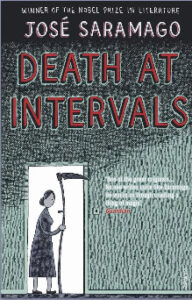
2008, 2008 (paperback edition, Vintage) (Translated by Margaret Jull Costa)
Language
English
On the first day of the New Year, no one dies. This understandably causes great consternation amongst religious leaders – if there's no death, there can be no resurrection and therefore no reason for religion – and what will be the effect on pensions, the social services, hospitals? Funeral directors are reduced to arranging funerals for dogs, cats, hamsters and parrots. Life insurance policies become meaningless. Amid the general public, on the other hand, there is initially celebration: flags are hung out on balconies and people dance in the streets. They have achieved the great goal of humanity – eternal life.But will death's disappearance benefit the human race, or will this sudden abeyance backfire? How long can families cope with malingering elderly relatives who scratch at death's door while the portal remains firmly shut? Then, seven months later, death returns, heralded by purple envelopes informing the recipients that their time is up. Death herself is now writing personal notes giving one week's notice. However, when an envelope is unexpectedly returned to her, death begins to experience strange, almost human emotions.
In his new novel José Saramago again turns the world on its head – an everyday event is snatched away, and humankind is left to make of it what it will.
What the critics say
The author's eccentric voice is as engaging as ever… a fitting cap to a body of work as playful as it is wise.'’
Financial Times
With characteristic dry wit he proceeds to debunk the rosy romance of eternal life
The Times
In the craft of the sentence, Jose Saramago is one of the great originals… no one writes quite like Saramago, so solicits and yet so magnificently free. He works as though cradling a thing of magic
Guardian
A compelling work by a fine writer … the unique Saramagoan style … gives the impression of a thought experiment to which the writer is merely a catalyst. That impression is a carefully crafted one: true art conceals its art, wrote Ovid
– New Statesman
Brilliant, hopeful novel
Observer
Romania
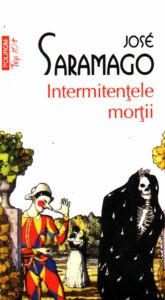
Intermitentele mortii este un romance ce are in centru perplexitatea umana in fata uneia dintre realitatile inevitabile ale existenti. Intr-o tara al carei nume nu este mentionat, se intimpla ceva ce nu sa mai pomenit de la inceputul lumii: moartea decides sa-si suspende activitatea. Din acel moment, destinul oamenilor stop the vesnic traiasca fi sa. Double or short period of euphoria, light becomes inseparable in the future, in the beginning of the caution differs moduri de a convinge moartea sa-sí reintre in drepturi, in a presiunilor din partea bisericii, the family ingrozite of batrinii and insists on the knife umbra pamintului, the sinucigasilor itself companiilor de pompe funebre. strong posibil ca, atunci cind ne gindim la asta, si poate inca si mai mult cind o exprimam, luind in considerae usurinta cu care obisnuiesc cuvintele sa ne iasa dingura, sa nu avem o constiinta clara a ceea ce ar putea insemna.„ (Jose Saramago). noastra. Raspunsul lor circular, tautologic este ca dragostea ne face umani. moarte.” (The Observer)
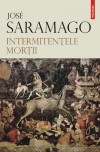
Polirom
2009 (Trans.: Georgian Barbulescu)
Language
Romanian
Intermitentele mortii este un romance ce are in centru perplexitatea umana in fata uneia dintre realitatile inevitabile ale existenti. Intr-o tara al carei nume nu este mentionat, se intimpla ceva ce nu sa mai pomenit de la inceputul lumii: moartea decides sa-si suspende activitatea. Din acel moment, destinul oamenilor stop the vesnic traiasca fi sa. Double or short period of euphoria, light becomes inseparable in the future, in the beginning of the caution differs moduri de a convinge moartea sa-sí reintre in drepturi, in a presiunilor din partea bisericii, the family ingrozite of batrinii and insists on the knife umbra pamintului, the sinucigasilor itself companiilor de pompe funebre. strong posibil ca, atunci cind ne gindim la asta, si poate inca si mai mult cind o exprimam, luind in considerae usurinta cu care obisnuiesc cuvintele sa ne iasa dingura, sa nu avem o constiinta clara a ceea ce ar putea insemna.„ (Jose Saramago). noastra. Raspunsul lor circular, tautologic este ca dragostea ne face umani. moarte.” (The Observer)
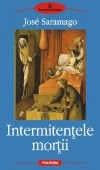
Intermitentele mortii este un romance ce are in centru perplexitatea umana in fata uneia dintre realitatile inevitabile ale existenti. Intr-o tara al carei nume nu este mentionat, se intimpla ceva ce nu sa mai pomenit de la inceputul lumii: moartea decides sa-si suspende activitatea. Din acel moment, destinul oamenilor stop the vesnic traiasca fi sa. Double or short period of euphoria, light becomes inseparable in the future, in the beginning of the caution differs moduri de a convinge moartea sa-sí reintre in drepturi, in a presiunilor din partea bisericii, the family ingrozite of batrinii and insists on the knife umbra pamintului, the sinucigasilor itself companiilor de pompe funebre. strong posibil ca, atunci cind ne gindim la asta, si poate inca si mai mult cind o exprimam, luind in considerae usurinta cu care obisnuiesc cuvintele sa ne iasa dingura, sa nu avem o constiinta clara a ceea ce ar putea insemna.„ (Jose Saramago). noastra. Raspunsul lor circular, tautologic este ca dragostea ne face umani. moarte.” (The Observer)
Russia
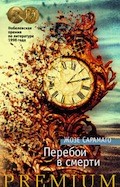
Жозе Сарамаго — один из крупнейших писателей современной Португалии, лауреат Нобелевской премии by по литературе 1998 года, автор скандально знаменитого «Евангелия от Иисуса».
В стране, оставшейся неназванной, происходит нечто невиданное с начала времен. Смерть решает прервать свои неустанные труды — и люди просто перестают умирать. Отныне их судьба — жить вечно. Эйфория населения сменяется отчаянием, все принимаются изыскивать способы покончить с таким невыносимым положением. Here's what you're looking for, what's going on here? вступает сама смерть — and меняет правила.
If you don't know what you're talking about, you'll be able to do it…
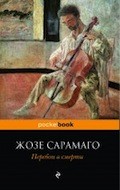
В стране, оставшейся неназванной, происходит нечто невиданное с начала времен. Смерть решает прервать свои неустанные труды – и люди просто перестают умирать. Отныне их судьба – жить вечно. Эйфория населения сменяется отчаянием, все принимаются изыскивать способы покончить с таким невыносимым положением. Here's what you're looking for, what's going on here? вступает сама смерть – and меняет правила. If you don't know what you're talking about, you'll be able to do it… More недавний роман португальского классика мировой литературы вызывает Евангелие от Иисуса“.
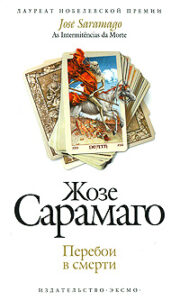
В стране, оставшейся неназванной, происходит нечто невиданное с начала времен. Смерть решает прервать свои неустанные труды – и люди просто перестают умирать. Отныне их судьба – жить вечно. Эйфория населения сменяется отчаянием, все принимаются изыскивать способы покончить с таким невыносимым положением. Here's what you're looking for, what's going on here? вступает сама смерть – and меняет правила. If you don't know what you're talking about, you'll be able to do it… More недавний роман португальского классика мировой литературы вызывает Евангелие от Иисуса“.
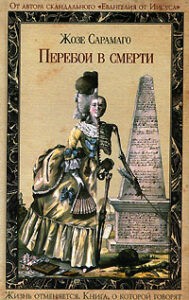
В стране, оставшейся неназванной, происходит нечто невиданное с начала времен. Смерть решает прервать свои неустанные труды – и люди просто перестают умирать. Отныне их судьба – жить вечно. Эйфория населения сменяется отчаянием, все принимаются изыскивать способы покончить с таким невыносимым положением. Here's what you're looking for, what's going on here? вступает сама смерть – and меняет правила. If you don't know what you're talking about, you'll be able to do it… More недавний роман португальского классика мировой литературы вызывает Евангелие от Иисуса“.
Serbia

U ponoć 1. januara, u jednoj neimenovanoj zemlji, na misteriozan način smrt prestaje da posećuje njene stanovnike. Od tog trenutka niko više ne umire i odgovor na ovu neverovatnu pojavu nisu u stanju da daju ni naučni, ni državni, ni crkveni autoriteti. Preko noći propadaju osiguravajuća društva, preti bankrot penzijskogsistema, ai hrišćansko učenje o vaskrsenju ozbiljno je dovedeno u pitanje… Kako obični ljudi doživljavaju smrt u ovim okolnostima, na šta su, uprkos prvobitnom ushićenju, spremni da bi je se ponovo domogli – pripoveda se u ovom romanu baroknog stila i raskošne imaginacije, još jednoj Saramagovoj alegoriji koja dotiče večna pitanja čovekovog postojanja i njegove sudbine.Saramagova proza je glas koji obuhvata sve glasove, kao univerzalni unutrašnji žamor. Oni koji nisu ? ljudi su ushićeni. Shvataju da su se domogli „najvećeg sna čovečanstva od njegovog prapočetka“. S vremenom, za trezvenije umove, kraj umiranja pretvara se u pretnju: „Ako ne počnemo ponovo da umiremo, za nas nema budućnosti!” DT Maks, The New York Times
Saramago preobra? tužna.
La Revelacion
Smrt i njeni hirovi preispituje niz teoloških i metafizičkih pitanja o poželjnosti utopije, mogućnosti raja i pravih osnova religije.
Džejms Vud, The New Yorker
Briljantna satira koja zadire u prirodu smrtnosti.
Ben Bolig, The Observer
Sweden

I sin nya roman berättar 1998 års nobelpristagare, portugisen José Saramago, om hur döden en dag bestämmer sig för att gå i strejk. “Dödens nyckfullhet” är en stillsamt ironisk, lekfull betraktelse över livets komplexitet och över dess förutsättning: Döden.Inledningsmeningen i José Saramagos nya roman lyder: “Dagen därpå var det ingen som dog.” Döden har helt enkelt slutat att döda i det lilla landet utan namn, vilket till en början gör människor euforiska. Men glädjen går snabbt över, för även om de inte dör så blir de inte mindre sjuka eller åldersstigna för det. Kaos och desperation inträder, och efter ett år insert Döden att det är dags att börja jobba igen. Men istället för att slå till oanmäld tänker hon nu förvarna sina offer genom att slicka dem ett violett brev en vecka innan hon kommer för att hämta dem.Så inträffar det otänkbara att ett av breven kommer i retur …
Turkey
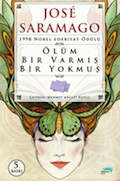
Adı bilinmeyen bir ülkede, dünya kuruldu kurulalı görülmemiş bir olay gerçekleşir: Ölüm, o güne kadar yerine getirdiği görevinden vazgeçer, hiç kimse ölmez olur. Bir anda ülkeye dalga dalga yayılan sevinç çok geçmeden yerini hayal kırıklığı ve kaosa bırakır. İnsanların ölmemesi zamanın durduğu anlamına gelmemektedir, ezeli bir yaşlılıktır artık onları bekleyen. Hükümetten kiliseye, sağlık kurumlarından ailelere, şirketler.
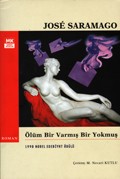
Adı bilinmeyen bir ülkede, dünya kuruldu kurulalı görülmemiş bir olay gerçekleşir: Ölüm, o güne kadar yerine getirdiği görevinden vazgeçer, hiç kimse ölmez olur. Bir anda ülkeye dalga dalga yayılan sevinç çok geçmeden yerini hayal kırıklığı ve kaosa bırakır. İnsanların ölmemesi zamanın durduğu anlamına gelmemektedir, ezeli bir yaşlılıktır artık onları bekleyen. Hükümetten kiliseye, sağlık kurumlarından ailelere, şirketler.
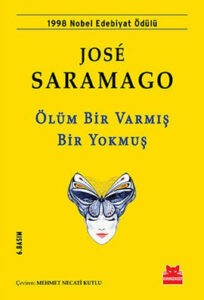
Adı bilinmeyen bir ülkede, dünya kuruldu kurulalı görülmemiş bir olay gerçekleşir: Ölüm, o güne kadar yerine getirdiği görevinden vazgeçer ve hiç kimse ölmez. Bir anda ülkeye dalga dalga yayılan sevinç çok geçmeden yerini hayalkırıklığı ve kaosa bırakır.
İnsanların ölmemesi zamanın durduğu anlamına gelmemektedir, ezeli bir yaşlılıktır artık onları bekleyen. Hükümetten kiliseye, sağlık kurumlarından ailelere, şirketlerden mafyaya kadar herkes ölümün ortadan kalkmasının getirdiği sonuçlarla mücadele etmek zorundadır. Ancak ölüm, beklenmedik bir kimlikle ve umulmadık duygularla insanların arasına geri döner.
Ölüm ve ölümsüzlük karşısında insanın şaşkınlığını, çelişkili tepkilerini ve ahlaki çöküşünü, edebi, toplumsal ve felsefi anlamda derinlikli bir biçimde işleyen José Saramago, geçici olanla ebedi olanı birbirinden ayıran kısa mesafenin meseli sayılacak Ölüm Bir Varmış Bir Yokmuş'u, başladığı gibi bitiriyor: “Ertesi gün hiç kimse ölmedi.”
(Tanıtım Bülteninden)
